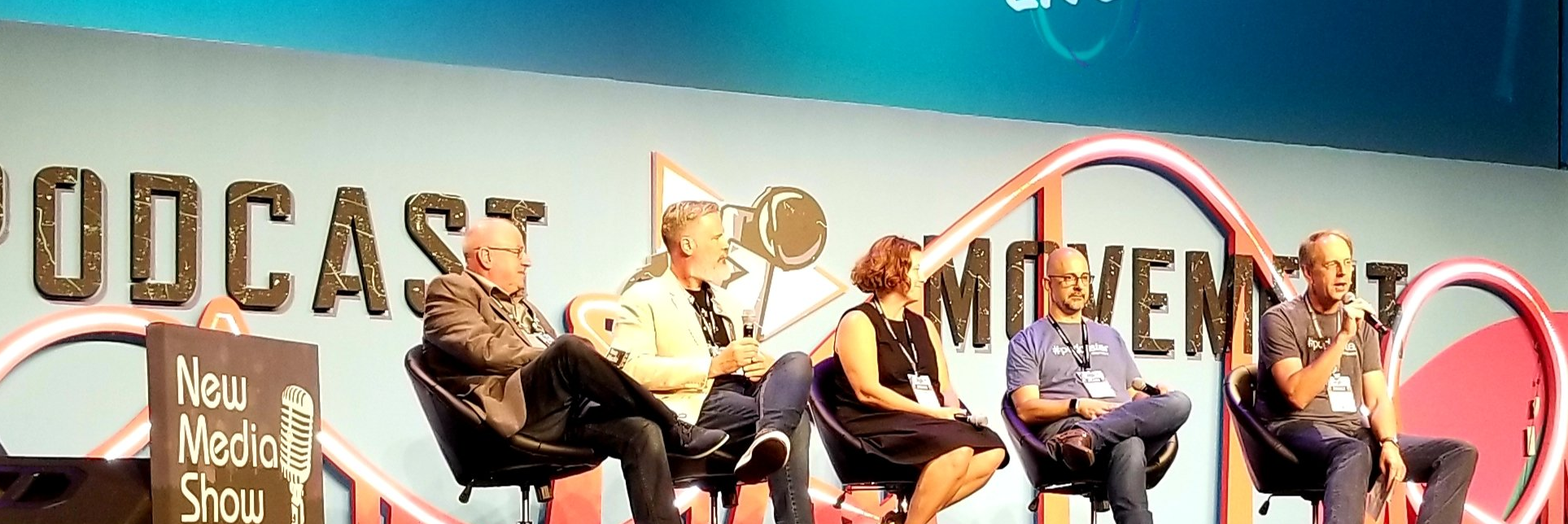By Rob Greenlee, Co-Host of NewMediaShow.com and Host of Trust Factor with Rob Greenlee

Many say that we are in a time of change and need to be open to innovation in the podcasting industry. Could some of these new ideas change podcasting in ways that may slow or harm the medium with such strong and consistent growth over the past 19+ years?
There is an explosion of interest in the video at large dominant platforms like YouTube, Spotify Video, Rumble, and all the other short and long-form video-consuming platforms.
Podcasting originated 19+ years ago around the idea of open distribution that gave the potential to reach as many listeners as possible. For most of that period, it has been assumed that to be considered a podcast by strict original definition; one must distribute via an RSS feed to many listening platforms and go to where audio listeners and, back then, video viewers were too.
The idea behind podcasting was to create an eco-system that is open and filled with new innovative ideas from software developers and content creators to do their craft in a way that was not limited by gatekeepers or large companies trying to control the creative process and to a large degree the distribution of the results of that creative process.
Exclusives have been an old media construct to create control and monetization for the platform and have been less about what is best for the creator. In most cases, the listening or viewing platform or network is the only beneficiary of exclusives.
See the quote below.
“I also think it means that broadcasters, or production companies, can probably be too quick to make things exclusive. Hiding them away when they aren’t significantly famous doesn’t probably generate you that much value.” The quote above from Matt Deegan
This topic of podcast exclusives has been evolving since the very early days of podcasting and is now declining with a challenging economy. Over the years, podcasting is still dominated by the RSS feed but has recently shifted to the model of RSS feeds being optional. That makes one go. Hmm, what is going on?
In a growing number of examples, more recently, these exclusives have meant shutting down the use of RSS feeds, and Spotify’s Anchor podcast hosting platform has made generating an RSS feed an optional ask and not a default function.
See the quote below from Spotify’s Anchor platform head, Michael Mignano, in a post earlier this past spring of 2021. This post explained the reasons for this change are that it gives the content creator more significant control over the distribution of the audio content. Still, this change at Anchor also has the unsaid benefit of getting Spotify exclusive shows on its platform for FREE in exchange for Free hosting, as their automatic ad insertion monetization strategy never reaches scale.
Greater control over which platforms ingest, publish, and monetize creators’ content: “As more and more new audio platforms emerge and look to capitalize on the growing audio space, creators must have control over which platforms are aggregating their content from the web (and in some cases, building their businesses on top of creators’ content without their consent). When a creator launches a new podcast on most podcast creation platforms (including Anchor), the platform automatically generates an RSS feed and publishes it to the open web. This published RSS feed makes it possible for any platform or website to ingest the RSS feed and display and even monetize the content. This can happen without explicit permission from the creator. As part of our distribution update, we will only generate an RSS feed if the creator explicitly wants one (and we’ll present clear options on how to do so at the time of publishing). This will ensure that each creator can explicitly publish their podcast with an RSS feed (enabling any platform to ingest, display, and monetize that content) rather than happening automatically without the creator’s consent.
Suppose you’re already an existing Anchor creator and would like to opt out of your RSS feed being published and available to be ingested by any platform. In that case, you may contact us anytime to request we change your distribution settings to your liking.” Quote from former Spotify’s Anchor platform head Michael Mignano
I do like the message and idea of giving content creators more control. We are emerging into a time when content creators or podcasters need to value their work more, and limiting access to it is one approach as Spotify Anchor is driving here, but doing it through a platform like Spotify may not be the best approach for most podcasters that are looking for growing an audience and potentially monetizing. The history of Anchor and now Spotify for Podcasters is not one with a solid history of generating and consistently publishing podcast shows with a growing audience. Still, it has been a platform full of podfaded shows.
Most shows created on the Anchor platform have exploded the false perception that the podcasting market is flooded with millions of new successful podcasts. Many now feel like it is too late to get into podcasting because it is too crowded, and the truth is it is just not too late.

 Given the reactions I am seeing in the media and on social media to issues around men sexual harassment of women. Why did half of this country look the other away and still elect Trump given his admitted abuse and harassment of women? Seems like a mixed message to me, especially given that he was running against a women for President.
Given the reactions I am seeing in the media and on social media to issues around men sexual harassment of women. Why did half of this country look the other away and still elect Trump given his admitted abuse and harassment of women? Seems like a mixed message to me, especially given that he was running against a women for President.